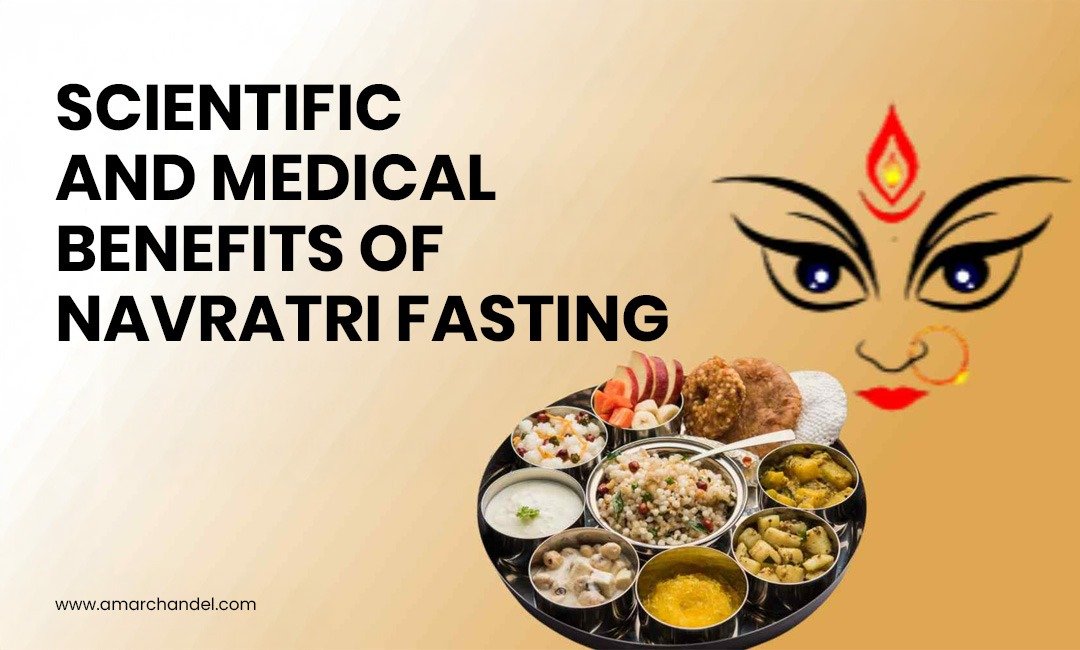Fasting during Navratras (the nine nights of Devi worship) is often approached as a spiritual discipline, but modern science and medicine show that it also has profound health benefits. Let me explain these in detail:
• Fasting lowers insulin levels and allows the body to switch from burning glucose to burning stored fat (ketosis).
• This improves insulin sensitivity, reducing the risk of type 2 diabetes.
• Studies on intermittent fasting and time-restricted feeding show reduced blood sugar spikes, better metabolic control, and improved fat utilisation.
- Detoxification and Cellular Repair
• When food intake is restricted, the body initiates autophagy—a process where old, damaged cells and proteins are broken down and recycled.
• This helps remove toxins, prevents the buildup of harmful proteins linked to diseases like Alzheimer’s, and promotes cellular renewal.
• Navratri fasting, which often excludes heavy, processed foods, reduces the toxic load on the liver and kidneys. - Weight Regulation
• Fasting reduces caloric intake naturally without feeling forced, helping in weight loss or maintenance.
• It enhances fat metabolism, which preserves muscle mass while reducing excess fat stores.
• The avoidance of fried and refined foods during Navratri adds to this effect. - Digestive Rest and Gut Health
• The digestive system is one of the most energy-demanding systems. Fasting gives it a chance to rest and repair.
• It enhances the balance of the gut microbiome, especially when sattvic foods like fruits, nuts, and dairy are consumed.
• Reduction in bloating, acidity, and indigestion is common. - Cardiovascular Benefits
• Fasting lowers blood pressure, triglycerides, and cholesterol levels.
• It improves arterial flexibility and reduces inflammation, lowering risk of atherosclerosis and heart disease.
• A study in Cell Metabolism found that intermittent fasting enhances cardiovascular health markers significantly. - Brain Health and Mental Clarity
• Fasting boosts production of Brain-Derived Neurotrophic Factor (BDNF), which supports neuron growth and brain plasticity.
• It increases mental clarity, alertness, and emotional balance.
• Many people report feeling lighter, calmer, and more focused during Navratri—partly due to fasting-induced neurochemical changes. - Hormonal Balance and Longevity
• Fasting reduces IGF-1 (Insulin-like Growth Factor 1), a hormone linked to cancer and ageing.
• Lower IGF-1 and enhanced autophagy increase lifespan and reduce age-related diseases.
• By balancing cortisol and other stress hormones, fasting also improves emotional resilience. - Immune System Boost
• Short-term fasting triggers the production of new white blood cells and enhances immune efficiency.
• It reduces chronic inflammation, a root cause of diseases like arthritis, cancer, and heart disease.
• Seasonal fasting, like Navratri, aligns the body with circadian and seasonal rhythms, making the immune system stronger.
Why Navratri Fasting is Especially Beneficial?
• It is seasonal: Navratras occur at the cusp of seasonal transitions (spring and autumn), when the body is most vulnerable. Fasting here helps adaptation.
• It is sattvic: Foods permitted (fruits, milk, nuts, rock salt, buckwheat, amaranth) are light, natural, and nourishing.
• It is mind-body integrated: Combined with prayer, mantra, and meditation, fasting reduces stress, lowers cortisol, and enhances overall well-being.

In essence:
Navratri fasting is not just a ritual. Modern science confirms that it:
• Detoxifies body and mind
• Resets metabolism
• Boosts immunity
• Enhances brain and heart health
• Promotes longevity
It is a perfect blend of ancient wisdom and modern medicine.


Give a Reply